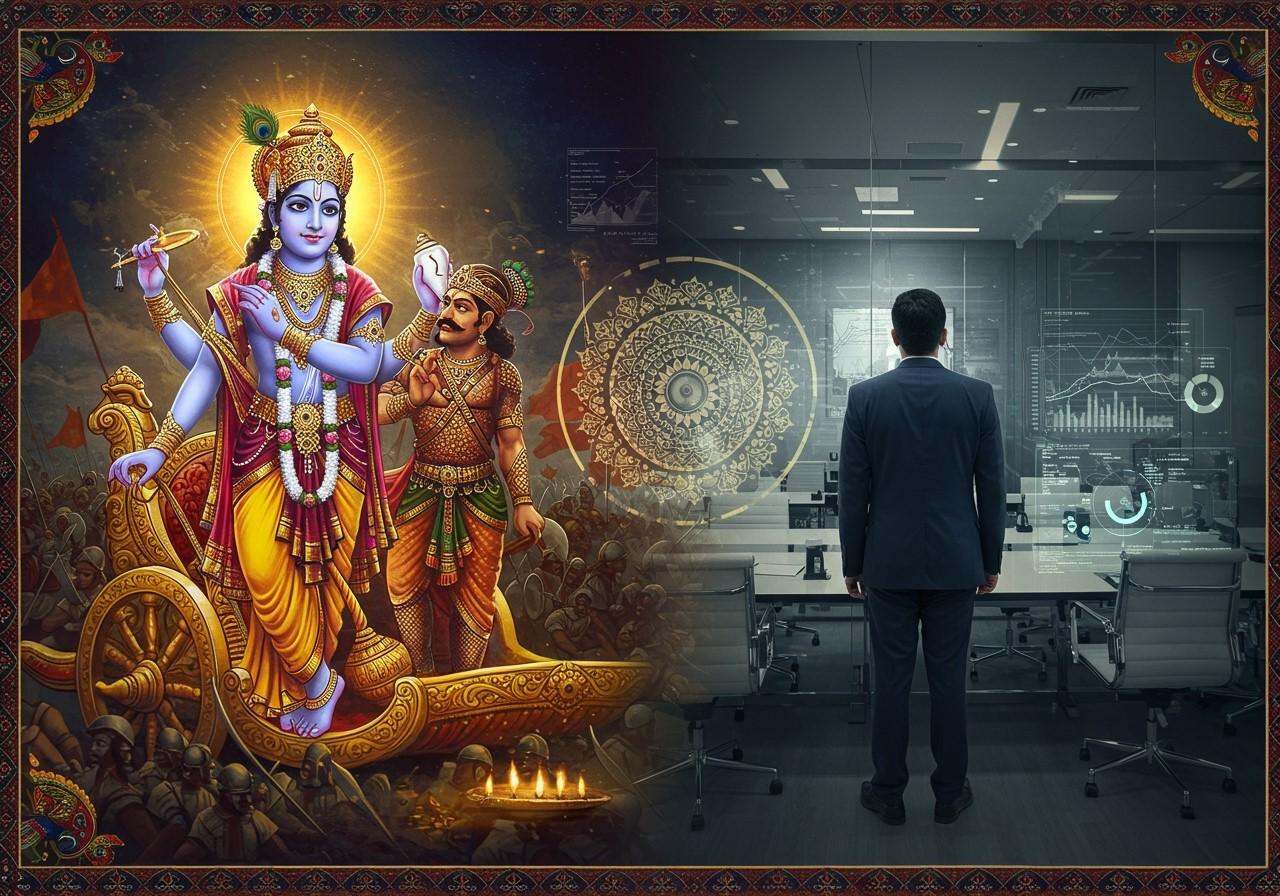
The Mahabharata, an ancient Indian epic, is more than just a captivating narrative of power struggles and divine intervention. It serves as a profound source of leadership wisdom, offering timeless lessons applicable to contemporary management. This article delves into how these ancient principles can guide modern leaders, particularly those within the middle and upper-middle classes of India, seeking authentic leadership rooted in tradition.
Historical Context and Relevance
Composed over two millennia ago, the Mahabharata explores themes of dharma (righteousness), karma (action), and leadership, which continue to resonate with Indian thought and leadership practices. Understanding this epic offers valuable insights into effective leadership, ethical conduct, governance, and human behavior. Its timeless appeal stems from its profound exploration of these critical aspects of human interaction and societal organization.
Leadership Lessons from Lord Krishna
Lord Krishna, a central figure in the Mahabharata, exemplifies visionary leadership. His strategic guidance to the Pandavas, coupled with the teachings of detachment and duty in the Bhagavad Gita, remains highly relevant. Krishna’s diplomatic acumen and ethical decision-making are crucial lessons for contemporary leaders, highlighting the importance of vision, ethics, and mentorship in navigating modern complexities.
Dharma and Ethical Leadership
Dharma, the principle of righteousness, is a cornerstone of the Mahabharata. Leaders can draw upon dharma to make ethical decisions, as exemplified by Yudhishthira’s unwavering commitment to righteousness. The epic demonstrates that unethical leadership (adharma) ultimately leads to negative consequences. Modern leaders must prioritize integrity and moral responsibility to build trust and inspire ethical conduct within their organizations.
Strategic Thinking and Adaptability
The Mahabharata showcases the importance of strategic thinking through its depictions of key battles and strategic maneuvers. Leaders must cultivate adaptability and flexibility, mirroring the Pandavas’ ability to adjust to changing circumstances. Understanding strengths and weaknesses, coupled with foresight and meticulous planning, is essential for success. A proactive “play-to-win” mindset is emphasized over a reactive “play-not-to-lose” approach.
Emotional Intelligence and Team Dynamics
Emotional intelligence, encompassing self-awareness, self-regulation, empathy, and social skills, is vital for effective leadership. The Mahabharata illustrates this through the interpersonal relationships within the narrative. The strong camaraderie among the Pandavas highlights the importance of empathy and understanding in building robust teams. The epic also demonstrates the significance of conflict resolution skills in maintaining positive relationships and a productive work environment.
Mentorship and Succession Planning
The Mahabharata underscores the significance of mentorship through the guru-shishya (teacher-student) tradition, exemplified by figures like Drona and Bhishma. Effective mentorship extends beyond skill development to encompass guidance, support, and constructive feedback. Succession planning, crucial for leadership continuity, is also highlighted in the training of the Pandavas and Kauravas, offering valuable lessons for modern organizations in developing future leaders and ensuring long-term stability.
Conclusion: Embracing Timeless Wisdom for Modern Leadership
The Mahabharata offers invaluable leadership lessons that resonate even today. By integrating these principles of mentorship, emotional intelligence, strategic thinking, and ethical leadership into modern management practices, leaders can cultivate a balanced and effective approach. The epic’s wisdom empowers leaders to navigate contemporary challenges with confidence and responsibility, inspiring their teams towards success by blending traditional values with modern practices. Drawing inspiration from figures like Krishna and Draupadi, who exemplify unwavering focus on duty, strength of character, and commitment to the greater good, contemporary leaders can effectively navigate modern complexities.
FAQs on Mahabharata & Modern Management
How can the Mahabharata be relevant to modern management? The Mahabharata provides timeless lessons on leadership, strategy, and conflict resolution applicable to today’s management challenges. It offers a framework for ethical decision-making, strategic planning, and team management, principles that remain highly relevant in the contemporary business world.
What leadership principles from the Mahabharata are useful for today’s leaders? Ethical decision-making (dharma), strategic planning, and team management are key principles from the Mahabharata that remain highly valuable for modern leaders. These principles provide a foundation for building strong, ethical, and successful organizations.
How does the character of Krishna influence modern management practices? Krishna’s role as a guide, strategist, and diplomat offers valuable insights into effective leadership and mentoring. His ability to navigate complex situations, build alliances, and resolve conflicts provides a practical model for modern managers.
How Poojn.in Supports Your Journey Through Mahabharata’s Wisdom
Poojn.in, India’s leading cultural goods and services store, offers a wide range of products to connect with the Mahabharata’s teachings:
- Sacred Texts and Books: Explore complete Mahabharata sets, Bhagavad Gitas with commentaries, and books analyzing leadership lessons from the epic. Delve deeper into the wisdom of this ancient text and its practical applications for modern life. Explore related blog post.
- Ritual Items for Krishna Worship: Enhance your spiritual practice with pure copper and brass puja items, exquisite Krishna murtis, and traditional puja accessories. Create a sacred space for reflection and connection with the divine. Find authentic Krishna Murtis here.
Visit Poojn.in today to discover how we can support your exploration of the Mahabharata’s timeless wisdom.

